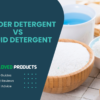In recent times, it has become a common practice to use fabric conditioners after washing the laundry.
But the question still stays the same – “Is Fabric Conditioner Necessary for Laundry.”
There is a lot of information on the internet that is overwhelming and confusing as well.
To find out the absolute truth, we have investigated the science and sociology behind fabric conditioners, their role and their potential impact on our laundry routines.
We have also consulted experts, checked customer testimonials, and scrutinized the evidence to provide only the right answer.
Is Fabric Conditioner necessary for Laundry?
The simple answer is YES and No. Confused?
It is true that fabric conditioner helps to reduce wrinkling and removes odors but it is equally important that not every fabric requires a conditioner.
If you want to know further, read the information provided in this article thoroughly.
How Does Fabric Conditioner Work?
The chemistry of fabric softeners is quite fascinating because it involves both chemical and physical interactions with textile fibres. Let’s delve into more detail on how these substances work.
Chemical Composition:
Fabric softeners generally contain the following types of chemical components:
Cationic Surfactants: These are the primary active ingredients in most fabric softeners. They are usually quaternary ammonium compounds, which, as mentioned earlier, have a central nitrogen atom bonded to four organic groups. The molecule has a positive charge, which is important for its function. Examples include distearyldimonium chloride and dialkylethyl ammonium chloride.
Emulsifiers: They help disperse the cationic surfactants evenly in the liquid fabric softener.
Stabilizers: These are added to maintain the shelf life of the fabric softener and prevent the active ingredients from separating.
Fragrances and Dyes: These are used to give the fabric softeners their distinctive smells and colours.
Preservatives: These are added to prevent microbial growth within the fabric softener product.
How They Work:
When you add fabric softener to your wash, it disperses in the water and meets your laundry. The action of the softener is based on two main chemical processes:
Adsorption:
The cationic surfactants are adsorbed onto the fabric surfaces. Since most fabrics have a negative surface charge, the positively charged quats are attracted to and bind to the fabric fibres. This process is facilitated by the heating and agitation during the washing cycle.
Lubrication:
The long hydrophobic tails of the surfactant molecules insert themselves between individual fibres and fibre filaments, providing a lubricating layer. This reduces the friction between the fibres, making them feel softer to the touch. This also makes the fabric less prone to static cling and easier to iron.
Benefits of Using Fabric Conditioner for Laundry
Using fabric conditioner, also known as fabric softener, in your laundry routine can offer a variety of benefits that enhance the comfort, appearance, and longevity of your clothes and linens. Here are some of the key benefits:
- Softness: The primary benefit of fabric conditioner is the softness it imparts to your clothes. The conditioning agents smooth out the fibres, reducing the harshness of laundered fabrics against the skin. This can be particularly noticeable in items like towels, bed linens, and even denim.
- Fragrance: Fabric conditioners are often infused with long-lasting fragrances. They can leave your laundry smelling fresh and clean for days after washing, which enhances the overall sensory experience of your clothing and linens.
- Reduced Static Cling: Static cling occurs when different items of clothing rub together in the dryer, transferring electrons and causing them to stick to each other. Fabric conditioners neutralize the electrical charges on the fabric, thereby reducing static cling.
- Easier Ironing: By causing fibres to relax and reducing friction between them, fabric conditioners can make fabrics less wrinkled out of the wash and thus easier to iron. Some conditioners even contain silicones that help the iron glide more smoothly over the fabric.
- Reduced Wear and Tear: When fibres are lubricated by a fabric conditioner, they are less likely to wear down from friction during washing and drying cycles. This can mean your clothes maintain their colour and texture longer and pill less.
- Improved Air Drying: If you air dry your clothes, fabric conditioners can help keep them from becoming stiff and rough, which is a common issue with line-dried laundry.
- Makes Clothes Less Absorbent: This can be a benefit for garments that you do not want to retain moisture, such as workout gear or raincoats. However, it is worth noting that this is not a benefit for items like towels and cleaning cloths, where absorbency is key.
- Colour Retention: By reducing the abrasion and friction between fibres, fabric conditioners can help prevent the fading of colours over time.
Potential Drawbacks of Using Fabric Conditioner For Laundry
While the benefits of using fabric conditioners are appealing, it’s also important to consider the type of fabrics you’re using the conditioner on and the potential long-term effects.
For instance, using fabric conditioners on microfiber or high-performance sportswear might reduce their moisture-wicking properties.
Moreover, some argue against the environmental impact of certain chemicals found in fabric conditioners.
As with any laundry product, weighing the pros against any cons is essential to determine if it’s the right choice for your household.
Can Fabric Conditioner Damage Clothes?
There is ongoing discussion regarding the potential negative impacts of fabric softener on laundry. Notably, fabric softeners can leave a coating on fabrics that, over time, could reduce the absorbency of items like towels and affect the breathability of activewear. However, when used according to manufacturers’ instructions and with the right types of fabrics, fabric softeners can also make clothes feel softer and reduce static cling without causing significant damage.
Does Fabric Conditioner Cause Damage to the Washing Machine?
The discourse surrounding fabric softeners centres on concerns that they may harm washing machines. Notably, fabric softeners can leave a coating. This residue can accumulate in a washing machine, potentially affecting its efficiency and lifespan. However, if used according to the manufacturer guidelines without over usage, then you may prevent any damage to the washing machine.
Conclusion
Fabric conditioner is not an absolute necessity for laundry, but it can offer benefits such as softer clothes and reduced static.
The decision to use it should be balanced with considerations of the type of fabric, personal preference, and the potential for buildup on clothing and machines.
Ultimately, while fabric conditioners can enhance the sensory experience of freshly laundered clothes, its use is discretionary and should be tailored to individual laundry needs and the care instructions of specific garments.





